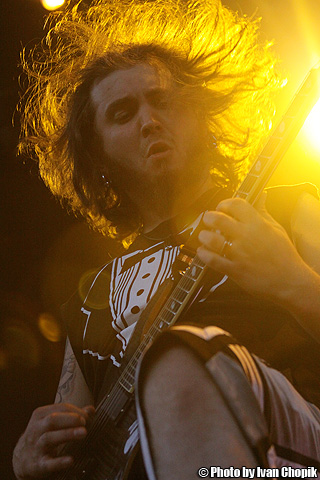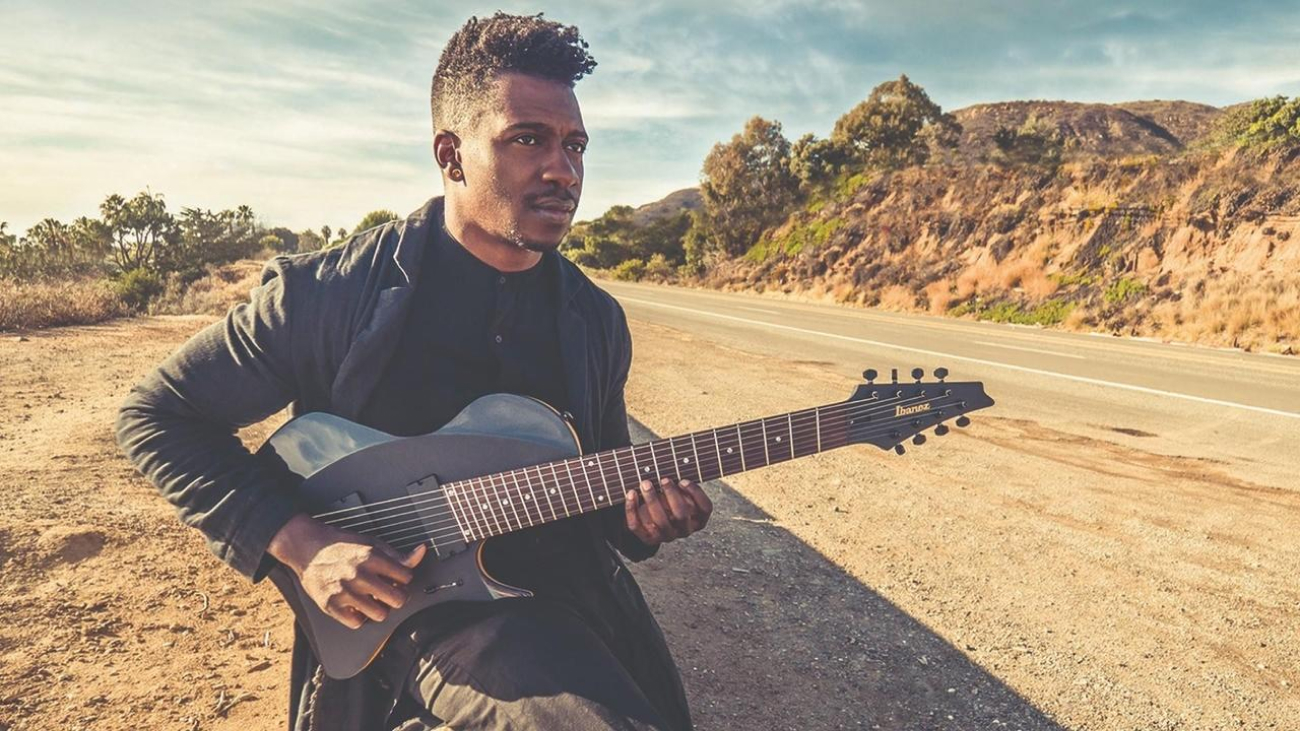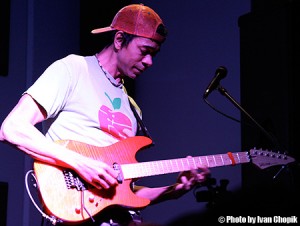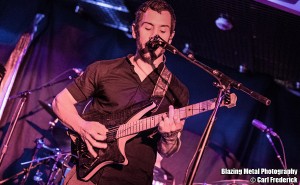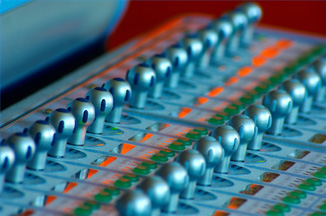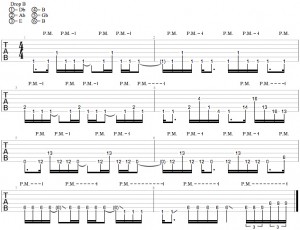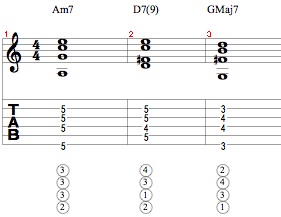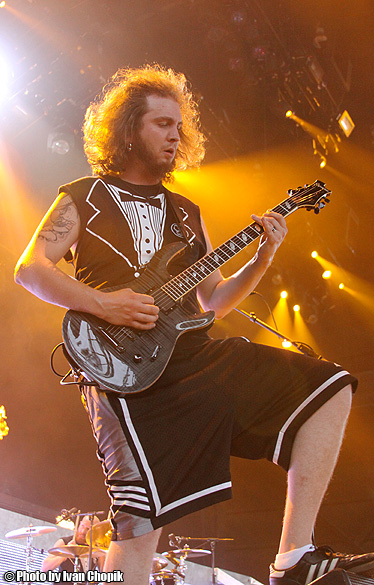 Joel Stroetzel is best known for being one of the axe-slingers for Massachusetts-based Metalcore pioneers Killswitch Engage. In June 2009 the band released the self-titled Killswitch Engage, their fifth and highest charting album to date – debuting at #7 on Billboard’s Top 200. The record was produced by Brendan O’Brien, who has worked with acts such as AC/DC and Rage Against the Machine, and by Joel’s co-guitarist, Adam Dutkiewicz, who’s produced all of the band’s previous releases.
Joel Stroetzel is best known for being one of the axe-slingers for Massachusetts-based Metalcore pioneers Killswitch Engage. In June 2009 the band released the self-titled Killswitch Engage, their fifth and highest charting album to date – debuting at #7 on Billboard’s Top 200. The record was produced by Brendan O’Brien, who has worked with acts such as AC/DC and Rage Against the Machine, and by Joel’s co-guitarist, Adam Dutkiewicz, who’s produced all of the band’s previous releases.
Killswitch Engage continues to evolve the band’s signature sound – bringing forth some of their heaviest riffs thus far, while showcasing their memorable melodic hooks and compelling arrangements. Joel and Adam complement the signature sound with their best guitar tones to date – ranging from lush clean textures to walls of pummeling distortion. I had the pleasure of speaking with Joel at one of the final dates of the 2009 Mayhem Fest, in West Palm Beach, FL.
IC: How has the Mayhem Fest been for you guys this year?
JS: It’s been a great tour, man. It’s honestly one of the funnest summer festivals we’ve ever done – a lot of good people out here, a lot of good bands. A little too much drinking, but that comes with the territory, I guess [laughs]. It’s been a lot of fun.
IC: What have been some of the highlights so far? Anything in particular that stood out?
JS: Every band kind of hosts a party from time to time. A lot of bands have been doing barbecues and things like that – different activities from night to night. We’ve got ours coming up in a few days. But yeah, it’s just been fun, man. A lot of bands that I love to watch – All That Remains, the Trivium guys, Cannibal Corpse, Behemoth – awesome bands on this tour.
IC: You guys have been seeing a great deal of success with the new self-titled album on the Billboard charts, where it debuted at #7. What do you think you’ve done most differently from previous records?
JS: It’s hard to say. The whole recording process was different, and I think one thing that maybe helped us in the end was that the record didn’t really leak until like a week before, because we literally didn’t have it done. It didn’t exist until that point to leak, so I think it actually got to the point to where they were shipped to the stores, and that’s when it finally found its way onto the Internet. So I think people were anticipating it a little bit more, because it wasn’t floating around the Internet for so long. So maybe that contributed, who knows?
IC: I’d figure with you guys in general, there would be a lot less leaking since you record almost everything in your own studio in Massachusetts and Adam has a pretty tight grip on all of the sessions.
JS: Oh, definitely. Some of this one we did with Brendan O’Brien down in Atlanta, but yeah, it was fun. It’s done, it’s out there, and it seemed to do well the first month. We’re really excited – it’s doing better than we expected.
IC: Bringing Brendan O’Brien on board has mostly affected the vocals, from what I understand, because he produced Howard [Jones, vocalist] much more than Adam has in the past. Looking forward, do you think you’ll use an outside producer on the next record?
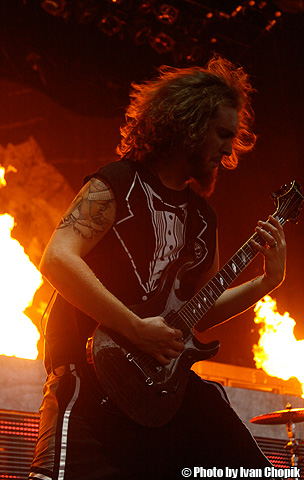
JS: I think it’s too soon to say. It definitely worked out great for Howard. I think it was nice for him to get an outside view. Brendan’s a really nice, chill guy – he’s all about the vibe, which is I think exactly what Howard needed. On the music side of things, it was good to have Adam on board, because we did most of the guitar stuff back at home like we normally would. You’ve got Adam, a stubborn Polish guy who wants to work twelve hours a day: ‘Let’s get this done! Let’s do this!’ But for somebody whose voice is their instrument, it doesn’t always work so well. So I think it was a good environment for Howard, working with Brendan.
IC: One thing I really dug on the previous records was Adam getting more involved in the background vocals, and the contrast of his voice with Howard’s. This time around I think you guys might have had some of those background vocals, but fewer than on the previous record.
JS: Actually, all of the vocals on this record are Howard’s. He’s doing different textures, different layers – and there’s lots of spots in the songs where I’d go: ‘Wow! I’ve never heard him sing like that before.’ It kind of took us by surprise when we first heard it, but it came out cool, man.
IC: I think songs like ‘The Return’ really expand the boundaries of this album. The main change I hear from previous releases is that some of the lighter parts have gotten more shimmery and spacey, and some of the heavier parts have gotten heavier. The style has expanded outward at both ends in songs like ‘The Return,’ which is some of your most rock-oriented material. How did that song come about?
JS: Well, ‘The Return’ was one of Adam’s songs. He brought it to the table, and it was a pretty stripped-down arrangement. It was only a couple of riffs. It had the droney little clean part that it starts with that almost goes through the entire song, a couple of heavy riffs, and the chorus and that was basically it. So we jammed on it a little bit, and Adam just started playing with some weird spacey delay pedals and stuff, and it turned out really cool.
In the studio, he just kept building and building – adding more high parts that worked off of each other, and it ended up being this really wide-sounding, kind of spaced-out tune. We’d never really done anything quite like that before. That was one of Howard’s favorites from the start. He really wanted to have a soaring melody over the chorus, and he definitely pulled that one off. It came out neat – it’s one of my favorite tunes on the record.
IC: Your clean parts have always stood out for their depth and wide textures, particularly on this album. What’s the layering process for building these tones?
JS: It depends on each song – on each arrangement. The basic clean tone we used on this record was a 70’s Fender Vibrolux. I’m not sure what year it is, it just happened to be in the studio. We got that dialed in using one of Adam’s Parkers for the clean stuff. They’ve got pretty cool electronics, like the piezo pickups and all that stuff, so in some of the spots we were blending. So that was fun, and on top of that we’d sometimes add a chorus, or a delay or something like an overdrive pedal. There’s a few spots where we played directly into a Leslie speaker – a rotating speaker. So that was cool to get some vibey, chorusy stuff going on. But the basic tone was that Fender Vibrolux.
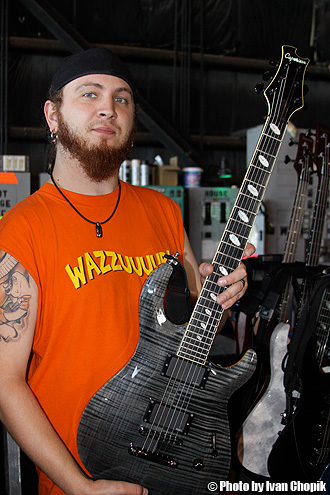
Joel with his new signature Caparison prototype
IC: As far as the heavy tones, you guys have gone through a bunch of different amps at this point – Soldano, Framus, Mesa, Fuchs… What do you look for in a heavy tone from an amp?
JS: It’s weird – in the studio, it’s a little bit different than what we look for live. We always look for a really wide sound for our rhythm tone, so we ended up using a Diezel VH4 for most of the rhythm tones, and the lead stuff is mostly the Splawn Nitro, which we’ve been using live a lot. The Nitros have a real in-your-face clear Marshally sound. So the live tone we go for is more like the overdub tone on the records – more like the lead tone, because it’s a little bit clearer. We’ve never really been into that super scooped-out tons-of-gain tone. We’re more into the 80’s rock Dokken, Van Halen kind-of brown sound thing, with a little more balls. So that was the basic recipe for the heavy stuff on the new record – the Diezel and the Splawn.
IC: On this album, and in general, is there such a thing as a Joel riff or an Adam riff? Are there certain characteristics of what you each typically bring to the table?
JS: I think so. That’s always the way it’s been with me and Adam – we have our different styles. On the opening track, ‘Never Again,’ the opening riff is a good example of an Adam riff – he likes to do off-time stuff and things like that, where as ‘Light In A Darkened World’ would be more of an example of something I would write. It’s more European metal and more straightforward. Adam tends to think outside the box a little bit more with rhythms and cool chord voicings, and I’ve always been more into the thrashy stuff.
IC: I’ve heard that you have a signature guitar coming out in the near future.
JS: Yeah, actually – a Caparison. I haven’t decided on the name of the model yet, I’m still working on that with the guys. So I’ve got a couple of prototypes, and I’ve been using them live. Got a few modifications to be done still before the final model comes out, which we’re hoping will be next year.
IC: Is there anything in particular that’s different about your signature model from the Caparisons you’ve been using up to this point?
JS: Yeah, it’s a little different. I’ve been using the TAT a lot live, and I used that on the record for most of my guitar stuff. The TAT’s a neck-through – it’s basically like a Jackson Soloist, but it’s got a Gibson-style bridge instead of a Floyd [Rose]. So the new guitar I’ve been working on is almost Paul Reed Smith-like – it’s got a mahogany back, a maple top, a set neck and a Gibson-style bridge and things like that. So it’s a little bit more of a lively-sounding guitar. The maple top’s a little bit brighter, and with better chord definition. So we’re still trying to work on the thunder – making it as heavy as possible.
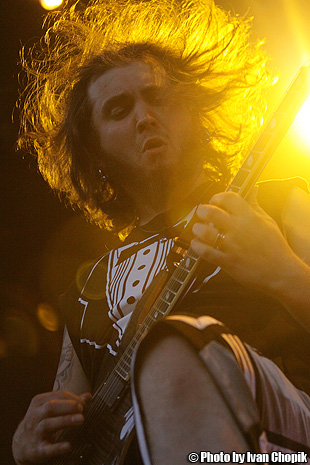
IC: Killswitch Engage spend a great deal of time on the road. Being in the bus with these guys all the time – how do you keep each other from biting each other’s heads off?
JS: We’re pretty lucky in that respect. Everybody gets along pretty well, for the most part. Some guys like to watch baseball, some guys like to drink, some guys like to play video games – everybody has their hobbies. I play guitar when I can get my hands on one. Everybody gets along pretty well. This tour in particular has been kind of strange. We actually have such a big crew that we had to do two buses, so there’s only six of us on the band bus. So it’s pretty mellow. There’s not a lot going on, so we can kinda space out, and we find ourselves going over to the tour bus to drink because we’re bored over there.
IC: Is there anything you can tell us concerning any new videos or tours in support of the new record?
JS: We’re still working on what song’s going to be the next video song. We’re deciding if we want to go heavier or more melodic – we’re trying to figure that one out. But as of now, we’re focusing on the touring side of things. We’re hitting Canada after this for ten days with In Flames, going to South America after that, and we’re in the process of putting together something hopefully in the UK and Europe for December. We’re not sure exactly how that’s gonna go down yet, but we’re going to try and make it back there before the end of the year. So that’s pretty much what we’ve got planned up until the end of the year.
IC: You guys have been through many of the ups and downs of the industry since you started. I believe you had your ten-year anniversary not long ago.
JS: Right around now, actually – if not August, then September. I think Mike [D’Antonio, bassist] and Adam started playing together a few months before I joined in, and then we got Jesse [Leach, former vocalist] a few months later. So we’re right around the ten-year mark right now. Crazy [laughs].
IC: With your experience in this market, what advice can you give to younger bands trying to get out there and get known?
JS: I think the hardest thing about getting out there and being a successful touring band is finding people who are willing to just drop everything and go for a while. So you’ve gotta know that the first couple of years tend to be kinda rough, you’re not really gonna make much money. You’ll kinda be in the red zone for a while [laughs]. Keep your credit cards clear for a while, because you’re gonna need that credit to pay for all the vans and strings and all that stuff. But if you stick with it – if you play a city enough times, people will eventually remember your name. And the States, in particular, is such a big market that it takes a while. You’ve really gotta try to get on as many tours as you can, and go around a few times before you have any great expectations.
IC: Before Killswitch got going, did you make a conscious decision to dedicate your life to music and being a touring musician, or did you fall into it?
JS: We kind of fell into it. We started the band as a hobby, just thinking that we would be going on little weekend trips to play shows out-of-state here and there, but it turned into something more when we got involved with Roadrunner [Records].
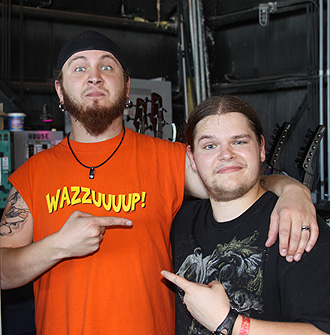
Joel Stroetzel and Ivan Chopik
We were like: ‘Wow, there’s a pretty big label that has some interest in us. Maybe we should give this a real shot. Maybe we should leave our jobs and stuff, and just try it for a year.’ We finally had a little bit of tour support, so we could afford to do that. ‘Let’s see what happens. Let’s give it a year – if we get more successful, then great, we’ll keep going. If it doesn’t work, it doesn’t work.’ We were lucky – it worked out pretty well.
IC: Along the way, did you come across any people that weren’t as committed as you are to the band life? Many people seem to be committed to music, but when it comes down to it, it’s tough for them to leave the comforts of their regular life.
JS: Oh, sure. We meet a lot of people in other bands who hate touring. ‘Ah, man, another tour. This sucks!’ Then there’s other people that can’t wait to do it. ‘This is my life. This is what I wanna do – drop everything and go.’ We’re somewhere in the middle. We obviously love playing shows, but sometimes it’s tough to leave home – leave the wives and the dogs, whatever people have waiting for them at home. It’s tough to walk away from that sometimes. It’s become our job. It’s a lot of fun, but it’s definitely still a sacrifice.
IC: Wrapping it up, where do you see yourself five or ten years down the road?
JS: It’s hard to say, man. Hopefully we can continue to do this – crank out a few more records. It’s hard to say. Nobody really knows where the industry is going to go, or where the economy is going to go. We’ve been lucky enough to do it for a decade now, so hopefully we can maintain this. I don’t think anybody expects us to be some huge band or anything, but as long as we get to keep doing music for a living, we’ll be pretty happy – at least, that’s the goal [laughs].



